Best At-Home Dog Allergy Test Kits 2024 — Reviews & Top Picks

Canine Bible is reader-supported. We receive affiliate commissions via some of our links. This doesn’t affect rankings. Learn more.
Ever since my dog developed a bad case of allergies, I’ve been determined to find the best at-home dog allergy test kit to identify those pesky allergens that make my pup miserable.
I did some research and found a few different types of tests available. I put together this guide covering how dog allergy tests work and can help determine if your dog is allergic to certain foods, environmental factors, and other allergens. I also reviewed first-hand the best dog allergy and intolerance tests and recommend our top picks to help dog parents in similar situations.
If your dog is excessively licking or scratching or showing skin problems such as lesions, hives, hair loss, or even experiencing digestive issues, it’s time for canine allergy testing. This can help you uncover what may be triggering your pup’s allergies, all from the comfort of your home. Let’s dive in!

Best Dog Allergy Test Kits — At A Glance
The Research
Jump to: Full Reviews | Additional Info
Why You Should Trust Us
brands recommended
Our writers, editors, and in-house veterinarians spend hours analyzing and reviewing products and services to help you find what’s best for you. Read the product review methodology and editorial mission to find out how we test, analyze, and rate.
What Is A Dog Allergy Test?
Dog allergy tests can help determine whether your dog overreacts to certain substances (allergens), such as food sources or external environmental factors that could harm their health and overall well-being.
There are four main types of dog allergy testing methods:
In-Office Dog Allergy Testing vs At-Home Allergy Testing
At-home allergy test kits only test intolerances (sensitivities) that develop over time. A blood or skin prick test is recommended if you want to test for true allergies (IgE allergies). It’s crucial to understand the difference between true allergies and intolerances in dogs before testing.
True allergies occur when your dog’s immune system perceives a certain substance (allergen), like bee stings or chocolate, as harmful, causing symptoms such as itching, swelling, hives, or anaphylaxis. True allergies occur within minutes of exposure to an allergen. Intolerances, however, do not involve the immune system. They usually stem from a dog’s inability to digest certain substances, like lactose, leading to gastrointestinal issues such as diarrhea. Intolerances can also be caused by environmental factors, such as new bedding or rugs that could trigger sneezing or itching in dogs.
At-home dog allergy test kits are not a substitute for a veterinarian consultation for suspected true allergies. Use them as a complement to your vet’s blood or skin tests.At-home dog allergy test kits are only available as hair and saliva tests and offer a quick, non-invasive alternative to traditional blood and skin tests. These kits can test for 100 to 355 different allergens.
What Allergies At-Home Dog Allergy Kits Test For?
At-home dog allergy testing kits can test for the most common types of sensitivities or intolerances in dogs, including:
How Does At-Home Dog Allergy Testing Work?
Depending on the company’s requirements, you must collect a saliva or hair sample and send it to their lab. The kit comes with clear instructions and necessary materials, making the process simple. Within a few weeks, you’ll get the results by email. Discussing these results with your veterinarian is important to establish the best treatment plan for your dog.
Dog Allergy Testing Reports
Most at-home dog allergy test companies provide a color-coded report where your dog’s intolerances are categorized into different levels.
For example, the 5Strands test categorizes over 350 items on a 4-point scale: Level 0 (insignificant response), Level 1 (mild intolerances), Level 2 (moderate intolerances) and Level 3 (severe intolerance).
This helps in determining safe foods and those to avoid. For example, my experience with dog Bandit revealed chicken as a compatible protein, contrary to my assumption, and a severe intolerance to beef, which was in products I used for him. The test improved Bandit’s health by eliminating these intolerances and offered significant cost savings.
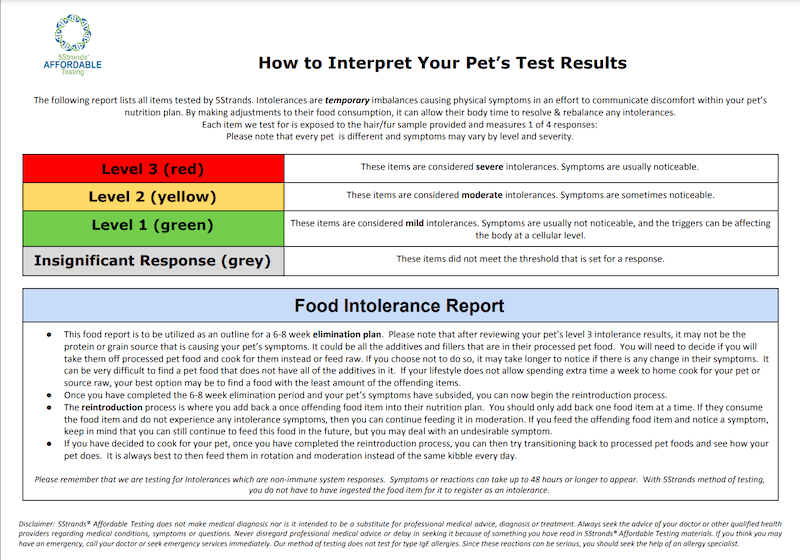
What Causes Dog Allergies?
Allergic dermatitis, or skin allergies, is the most common allergy in dogs. Food and environmental factors are the primary causes. Food allergies account for about 10% of dog allergy cases.[1] Dogs are most commonly allergic to the following foods: beef, dairy, wheat, egg, chicken, lamb, soy, pork, rabbit, and fish, with rabbit and fish being less common. However, most dogs are allergic to multiple substances. Common environmental and airborne allergies can be triggered by fleas, dust mites, molds, and pollens from various plants and other inhalants. Home allergens might include perfumes, cleaning products, and other household items.
Why Test Your Dog For Allergies
Testing your dog for allergies is advisable, as dogs can develop allergies like humans. Allergy tests can guide you and your veterinarian in creating a treatment plan, including avoiding certain allergens like foods, medications, shampoos and environmental factors.
Neglected dog allergies can lead to poor health, lack of energy, mood changes, and other issues. Untreated dog allergies may also lead to secondary infections, resulting in hot spots, inflammation, and hair loss. Additionally, allergies can cause Lick Granuloma, a condition where a dog excessively licks an itchy area, often due to allergies. This obsessive licking can create a wound, leading to a cycle of self-trauma, inflammation, and infection.[2] If your dog is excessively licking or scratching, it’s crucial to use a reliable dog allergy test to determine if allergies are the cause and to prevent these complications.
In my experience, I wanted to check if my three dogs had food intolerances, as they’ve been picky eaters with past stomach issues. Identifying the foods causing allergic reactions was invaluable. It allowed me to modify their diets so my dogs could enjoy their food without experiencing digestive issues. For instance, I wouldn’t want to feed my dog a beef diet if they’re allergic to beef, as this could potentially cause distress to my pet. Thus, I decided to conduct an at-home dog allergy test to address these concerns.
Dog allergy tests are a valuable resource for dog parents when deciding what dog food to order and providing a safe environment and lifestyle to ensure their dogs are happy and healthy.And because people often confuse food intolerance symptoms with allergy symptoms, an allergy or intolerance test can save you time and money on unnecessary treatments. These tests, particularly at-home dog allergy tests, can identify food sensitivities impacting a dog’s digestive health at a lower cost than veterinary tests.
The Reviews
Jump to: The Research | Additional Info
Best Dog Allergy Test Kits
So, what is the best allergy test for dogs? We’ve reviewed some of the best at-home allergy tests for dogs to help you choose the right one for your beloved pup.
Allergens tested: 120+ food & environmental
Test type: Saliva
Accuracy: High
Results: 2 weeks
Price: $104
Key Features
Our Personal Experience
Here is a sample of what the report looks like if your dog tests positive for an item:

Our Video Review Experience
Allergens tested: 275 food ingredients
Test type: Hair
Accuracy: High
Results: 7-10 days
Price: $88
Key Features
Our Personal Experience
Our Video Review Experience
Offers different dog food allergy tests for specific needs. These include:
Allergens tested: 105 environmental
Test type: Hair
Accuracy: High
Results: 7-10 days
Price: $78
Key Features
Allergens tested: 120+ food, environmental & household
Test type: Saliva
Accuracy: High
Results: 2-3 weeks
Price: $101
Key Features
Allergens tested: 112 food ingredients
Test type: Saliva
Accuracy: High
Results: 2 to 3 weeks
Price: $298
Key Features
Allergens tested: 1000+ food, environmental & more
Test type: Hair
Accuracy: Good
Results: 2 days
Price: $79.99
Key Features
Allergens tested: 300 food and environmental
Test type: Saliva & hair
Accuracy: High
Results: 2 weeks
Price: $129.95
Key Features
Additional Information
Jump to: The Research | Full Reviews
Using Your Dog Allergy Test Results
After receiving your dog’s test results, start by identifying foods and environmental elements with high intolerance levels and create an elimination diet or environmental adjustment plan. Consulting a canine nutritionist, like Tazz Latifi from 5Strands or another vet of your choice, can be highly beneficial. For instance, based on Bandit’s intolerances, we switched him to a chicken-based diet, avoiding beef, pork, and rabbit. We combined kibble with fresh food, opting for limited-ingredient kibble to reduce potential intolerances.
Monitor your dog’s response to these dietary changes. Additionally, consider environmental factors; Bandit’s intolerance to acrylic fiber and leather led us to cover his beds with bed cover, a simple yet effective solution.
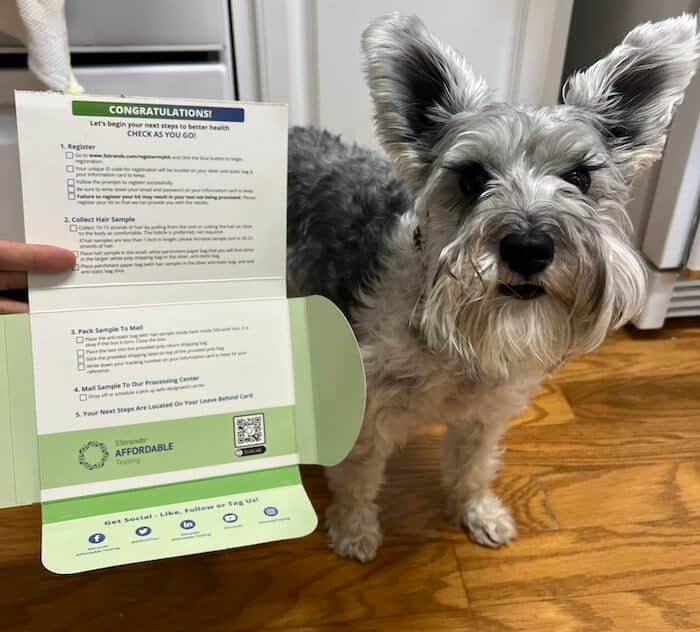
Types of Dog Allergy Tests
| Saliva | Hair | Blood (RAST test) | Skin (Intradermal Skin) | |
|---|---|---|---|---|
| Where to Take | At-Home | At-Home | Veterinarian | Veterinarian |
| Sedation Required | No | No | No | Yes |
| Risk | No | No | No | Yes |
| Price | Affordable | Affordable | Costly | Costly |
| Best Test | EasyDNA Dog Allergy Test | 5Strands | N/A | N/A |
| Procedure | Non-Invasive | Non-Invasive | Invasive | Invasive |
Are At-Home Dog Allergy Tests Accurate?
No dog allergy test is one hundred percent accurate. These tests can help you gain insightful information to prevent ingestion or exposure to potential allergens that could harm your dog. Our research indicates that skin and dog allergy tests have an accuracy level of about 75%.[5] Anecdotal evidence suggests similar accuracy figures, though some pet owners report lower or higher satisfaction levels with their results. Every dog is unique, so take the results with a grain of salt and consult your veterinarian.
At-Home Dog Allergy Test Cost
Dog allergy testing costs vary. A skin test by a pet dermatologist, involving pricking the skin to test for allergens, averages around $260. Blood testing ranges from $200 to $300, not including examination and additional fees, which can raise the total cost. In contrast, at-home dog allergy tests are generally cheaper, priced between $55 and $280. Read our dog allergy testing cost guide to learn about the factors that influence cost and which test might be a better fit for your budget.
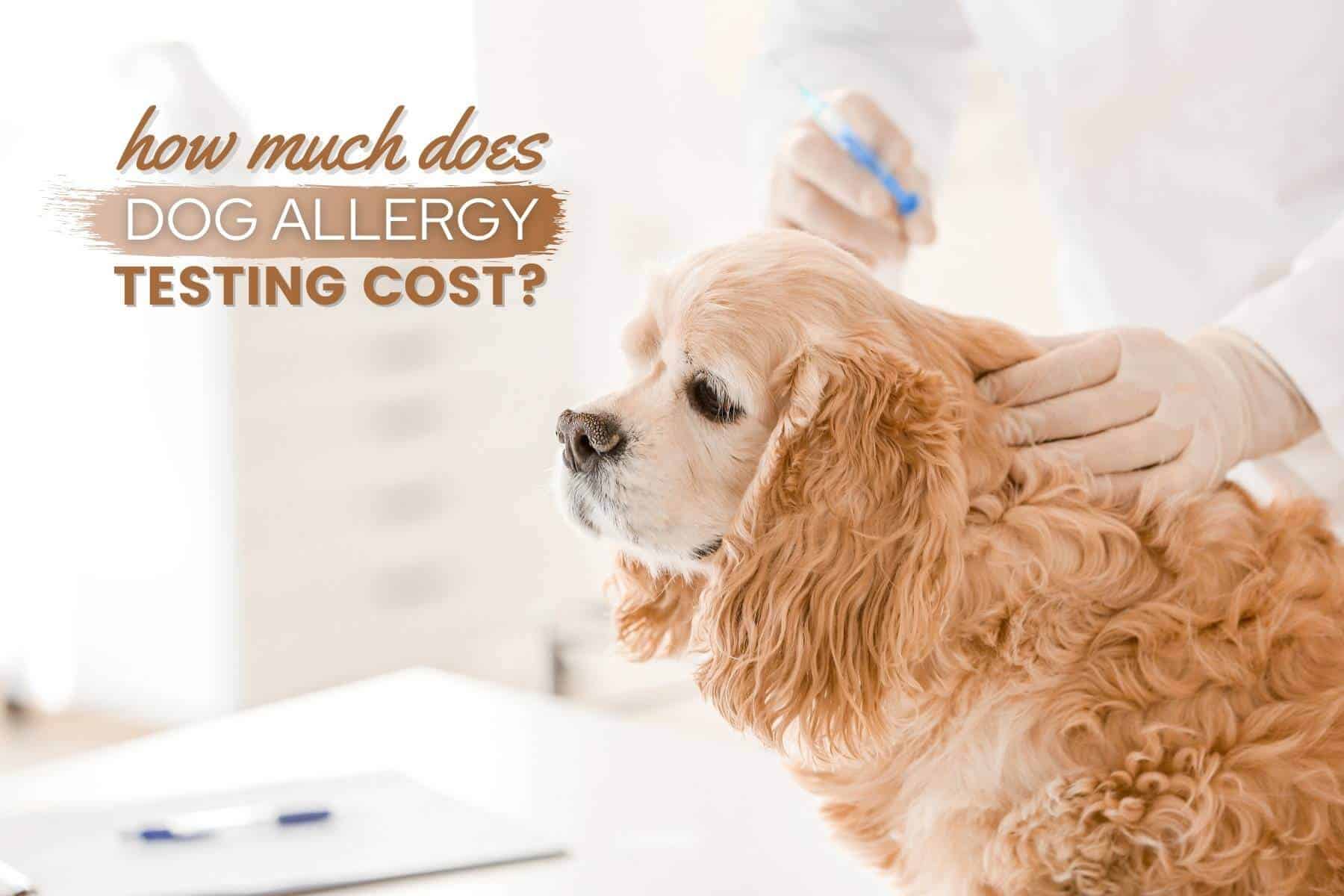
Dog Breeds That Need Allergy Testing The Most
If your dog belongs to a breed predisposed to allergies, it’s important to be vigilant for any signs of allergic reactions and consider allergy testing. The Merck Veterinary Manual lists the following breeds as most likely to develop allergies:
Other breeds include pugs, Maltese Terrier, Pekingese, Bichon Frise, German Shepherds, Pitbulls, Yorkies, and Poodle. However, any dog breed (or mixed breeds) can be allergic.[6]
The age of allergy onset for dogs is generally between 6 months and 3 years. Signs are usually seasonal but may be seen all year.Dog Food Allergy Test
Dog food allergies occur when the immune system mistakenly identifies harmless food as a threat, causing reactions like chronic ear inflammation, gastrointestinal issues, diarrhea, gas, rashes, and itching. Severe cases can lead to hives, facial swelling and anaphylactic shock, a life-threatening condition, says AKC’s Chief Veterinary Officer, Dr. Jerry Klein.[7]
According to the latest research, beef, dairy products, chicken, and wheat are the most likely food allergens contributing to skin-related allergies.[8] It’s important to remember that certain foods are toxic to dogs. Conducting a dog food allergy test can help identify the cause of these allergies. For more information, refer to our detailed article on dog food allergy testing.
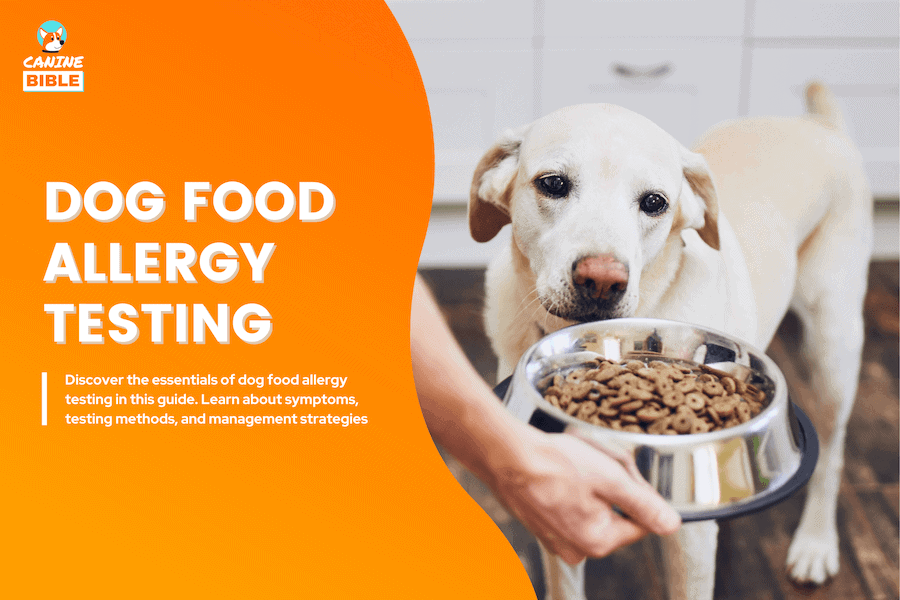
Frequently Asked Questions
Are Dog Allergy Tests Worth It? — Conclusion & Alternatives
I advocate for using at-home dog allergy tests. These tests can give pet parents insights into their dog’s potential allergies, helping them avoid foods and environmental allergens that cause intolerances, sensitivities, and distress. However, it’s important to interpret the results with your veterinarian’s assistance to avoid misdiagnosing. With their guidance, you can develop a new dietary plan or make lifestyle adjustments for your dog’s well-being.
Allergic reactions, whether digestive or skin-related, significantly affect a dog’s health. Fresh human-grade dog food or raw dog diet, characterized by all-natural ingredients and free from preservatives and additives, is an excellent choice to combat food allergies.
To learn more about maintaining your dog’s health, consider exploring our article on dog gut health tests, which can further reveal insights about your dog’s dietary sensitivities and overall health. And, if your dog is already experiencing allergies or intolerance symptoms, read our articles on the best dog allergy medications and home dog allergy remedies for the best comprehensive care. These resources can be invaluable in managing your furry friend’s allergies and ensuring they lead a happy, healthy life.
Like It? Subscribe & Share!
Sources
Canine Bible uses only high-quality sources, including peer-reviewed studies, to support the facts within our articles. Read our editorial process and product review methodology to learn more about how we fact-check, test products, and keep our content accurate, reliable, and trustworthy.
- Eckstein, S. (2012). Caring for a Dog with Food Allergies. WebMD.
- VCA Hospitals. (n.d.). Lick granuloma in dogs.
- MedlinePlus (n.d.). Intradermal allergy test reactions. Medlineplus.gov.
- Barnes C. & Barnette C. (n.d.). RAST testing in dogs. VCA Hospitals.
- University of Wisconsin Veterinary Care. (2018). Allergy testing [PDF file].
- White, S. D., & Moriello, K. A. (2022, October). Allergies in dogs. Merck Veterinary Manual.
- AKC Staff. (2023, November 9). Types of dog allergies and how to treat them. American Kennel Club.
- Mueller, R. S., Olivry, T., & Prélaud, P. (2016). Critically appraised topic on adverse food reactions of companion animals (2): common food allergen sources in dogs and cats. BMC Veterinary Research, 12(1).
Canine Bible authorship represents the unified voice of our entire editorial team and our in-house veterinarians rather than a single author. Each article, blog post, and review published under the Canine Bible name undergoes a rigorous review process, involving all team members to guarantee accuracy and up-to-date in accordance with the latest veterinarian research. This collaborative effort is an integral part of our editorial process and aligns with our four pillars of content creation. This approach ensures our content is backed by expert knowledge and factual information, offering our readers reliable, actionable, and trustworthy content.

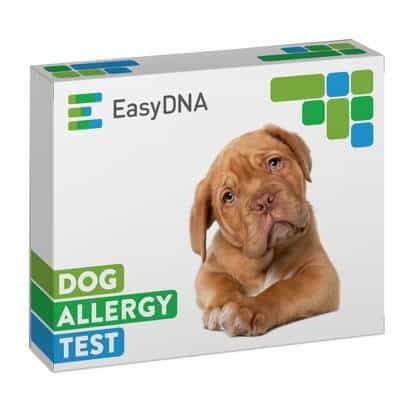
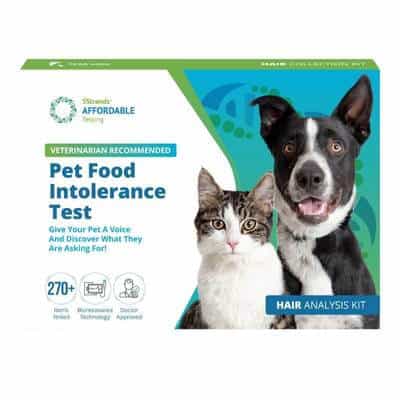
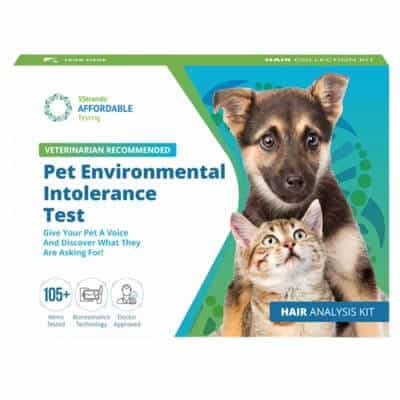



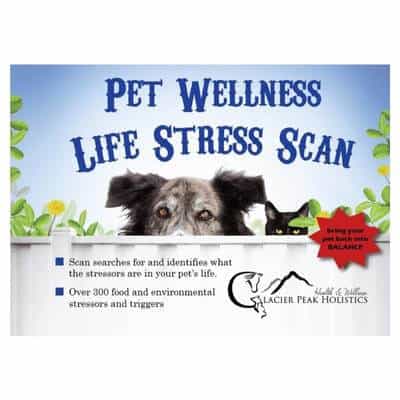
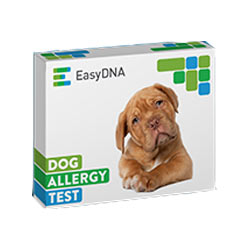

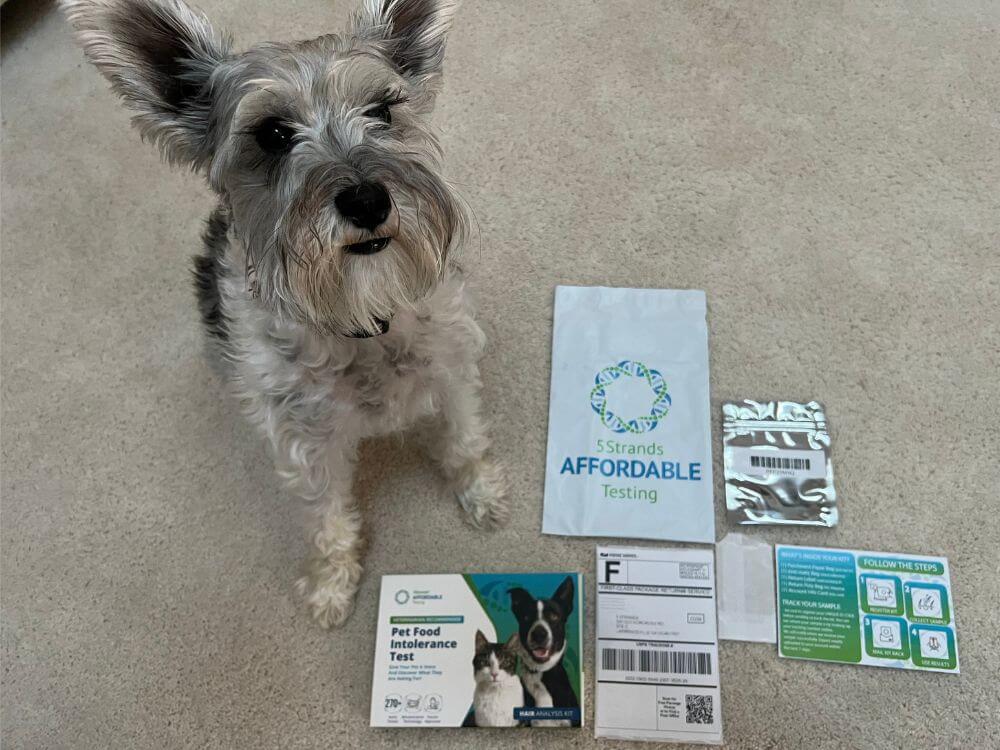






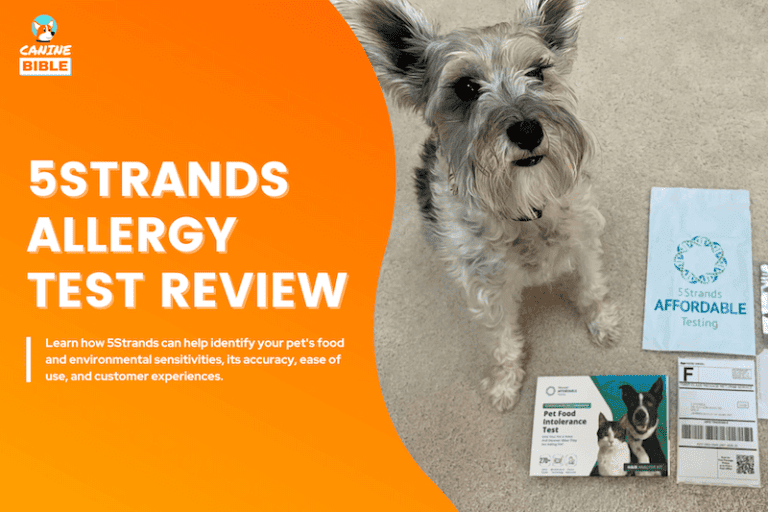

![CBG Oil For Dogs: What Is It, Dosage, Benefits, Best Brands [CBD vs CBG]](https://www.caninebible.com/wp-content/uploads/2021/11/cbg-oil-for-dogs-768x512.png)

